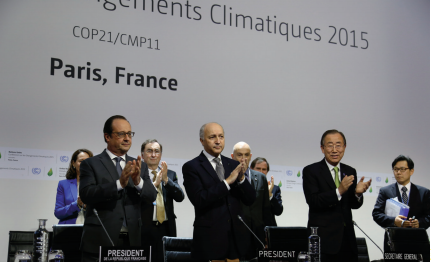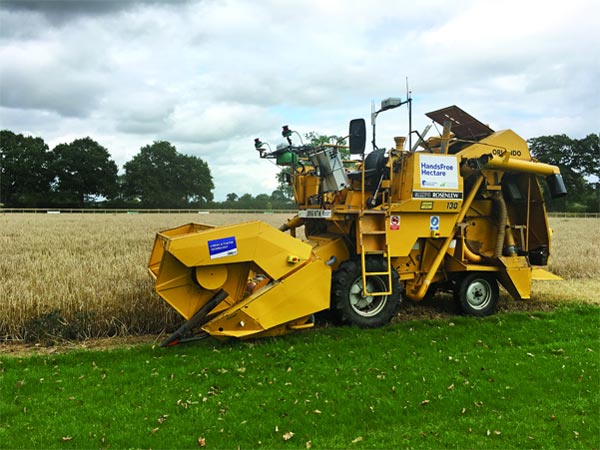The Blueprint for Business Leadership on the SDGs aims to inspire all business — regardless of size, sector or geography — to take leading action in support of the achievement of the Sustainable Development Goals (SDGs). It illustrates how the five leadership qualities of Ambition, Collaboration, Accountability, Consistency, and Intentional can be applied to a business' strategy, business model, products, supply chain, partnerships, and operations to raise the bar and create impact at scale. The Blueprint is a tool for any business that is ready to advance its principled approach to SDG action to become a leader. This chapter relates specifically to SDG 14.
The Blueprint for Business Leadership on the SDGs aims to inspire all business — regardless of size, sector or geography — to take leading action in support of the achievement of the Sustainable Development Goals (SDGs). It illustrates how the five leadership qualities of Ambition, Collaboration, Accountability, Consistency, and Intentional can be applied to a business' strategy, business model, products, supply chain, partnerships, and operations to raise the bar and create impact at scale. The Blueprint is a tool for any business that is ready to advance its principled approach to SDG action to become a leader. This chapter relates specifically to SDG 15.
The Blueprint for Business Leadership on the SDGs aims to inspire all business — regardless of size, sector or geography — to take leading action in support of the achievement of the Sustainable Development Goals (SDGs). It illustrates how the five leadership qualities of Ambition, Collaboration, Accountability, Consistency, and Intentional can be applied to a business' strategy, business model, products, supply chain, partnerships, and operations to raise the bar and create impact at scale. The Blueprint is a tool for any business that is ready to advance its principled approach to SDG action to become a leader. This chapter relates specifically to SDG 16.
The Blueprint for Business Leadership on the SDGs aims to inspire all business — regardless of size, sector or geography — to take leading action in support of the achievement of the Sustainable Development Goals (SDGs). It illustrates how the five leadership qualities of Ambition, Collaboration, Accountability, Consistency, and Intentional can be applied to a business' strategy, business model, products, supply chain, partnerships, and operations to raise the bar and create impact at scale. The Blueprint is a tool for any business that is ready to advance its principled approach to SDG action to become a leader. This chapter relates specifically to SDG 17.
ICIS,
ICIS Special Report, EPCA, 26 September 2016
There is a strong business case for increasing diversity and inclusion in the petrochemical workforce. EPCA’s new initiative on the subject aims to discover best practice and embed diversity and inclusion into management thinking and company DNA. This is important for advancing SDG 10.2 to empower and promote the social, economic and political inclusion of all, irrespective of age, sex, disability, race, ethnicity, origin, religion or economic or other status.
ICIS,
ICIS EPCA Supplement 2015, pages 56-57, 26 September 2016
Landmark emissions targets were outlined at the COP21 meeting in Paris in 2015 and the chemical industry will play an important role in achieving them. The support of the chemical industry is vital for advancing SDG 13.2 to integrate climate change measures into national policies, strategies and planning. This report also emphasises the opportunities that climate action brings to the chemical industry.
LexisNexis Legal & Professional,
Business Insight Solutions, September 2016
There are more than 45 million victims of modern slavery globally with a significant number involved in construction. This report argues that forced labour and modern slavery are common throughout the global construction industry. Engaging key stakeholders and raising awareness of the issue from a global perspective are key to the advancement of SDG target 8.7 to eradicate forced labour, ending modern slavery and human trafficking by 2025.
Farmers Weekly,
6 September 2017
The groundbreaking Hands Free Hectare project has just seen its first harvest. This £200,000 Innovation UK-funded project by Harper Adams University with Precision Decisions has modified existing machinery to drill, sow, spray and harvest the crop without any human control. The project aims to show how automation can facilitate a sustainable farming system where multiple smaller, lighter machines will enter the field, minimising the level of compaction (SDG 15, life on land and SDG 9, industry, innovation and infrastructure).
ICIS,
Special Report, 3 July 2016
Growing demands from brand owners and consumers for fibres and textiles that are more environmentally friendly are now creating a huge market for bio-based polymers produced using renewable feedstocks. The textile and packaging industries have a significant impact on the environment: this report highlights how recent developments in new materials support SDG 9 Industry, Innovation and Infrastructure, and SDG 7 Affordable and Clean Energy.
Elsevier,
Qing Chang,
Chapter 11 - Emulsion, Foam, and Gel,
Editor(s): Qing Chang,
Colloid and Interface Chemistry for Water Quality Control,
Academic Press,
2016,
Pages 227-245,
ISBN 9780128093153
Supports SDG 6 by discussing the application of colloid and surface chemistry in water and wastewater treatment- the only book of its kind to do this.





